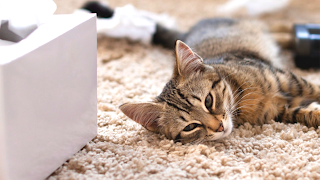Cats are complex creatures, and their behaviors can sometimes confuse even the most devoted cat lovers. One such behavior that might puzzle you is when your cat seems to be vibrating or shivering.
While cats might vibrate or shiver for a variety of reasons, it's essential to understand the root causes. This way, you can ensure that your furry friend is not experiencing discomfort or health issues.
Table of Contents
1. Purring
The most common cause of a vibrating sensation in cats is purring. When your cat is feeling content, happy, and relaxed, they will often purr, which can feel like a slight vibration. Purring is generally a good sign, indicating that your cat is comfortable around you.
2. Cold Temperature
Just like humans, cats can also shiver when they are cold. This involuntary response helps to generate body heat when they are exposed to lower temperatures. You might notice this behavior more frequently in colder months or if your cat has been outside in cool weather.
3. Fear or Stress
Cats may shiver or vibrate when they are stressed or afraid. Stress can be triggered by numerous factors, such as changes in the home environment, introduction of new pets, or a visit to the vet. In such instances, your cat may shake or shiver due to adrenaline rush.
4. Excitement
Cats can also shiver or vibrate out of excitement. It could be a favorite toy, the prospect of a meal, or your return home that triggers this response. This kind of shivering should be short-lived and stop once the excitement has passed.
5. Health Concerns
Sometimes, however, shivering can be a symptom of underlying health problems. If your cat is shivering constantly, seems lethargic, or displays other changes in behavior, it's a good idea to consult a veterinarian. Certain medical conditions, including hypoglycemia, kidney disease, neurological issues, or toxic ingestion, could cause shivering.
What Should You Do?
- Monitor the situation: Keep a close eye on your cat's behavior. If the shivering is occasional and does not appear to be causing discomfort, it is likely not a cause for concern.
- Comfort and Warmth: If you suspect your cat might be cold, provide a warm and cozy space for them to rest. A soft blanket or a heated cat bed can be great options.
- Stress reduction: Try to identify and eliminate any potential stressors. Maintain a consistent routine, introduce new pets or environments gradually, and ensure your cat has access to safe and quiet spaces in the house.
- Consult a Vet: If the shivering continues unabated, or if it's accompanied by other concerning symptoms, do not hesitate to seek professional help. A veterinarian can help identify if the shivering is a sign of an underlying health issue that needs attention.
In conclusion, while a vibrating or shivering cat can be perfectly normal under certain circumstances, it's important to monitor your pet's behavior closely. If the shivering is constant, intense, or accompanied by other signs of illness, immediate consultation with a veterinarian is necessary to rule out potential health problems. After all, your cat's wellbeing and happiness should always be a top priority.


